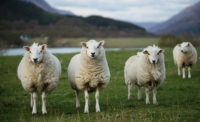Grant program quantifies impacts of targeted sheep grazing
USDA Climate-Smart Commodities Grant supports up to 150 sheep producers.

The American Lamb Board has received a USDA Climate-Smart Commodities Grant to quantify the impacts of targeted sheep grazing. The program is designed to measure and report carbon sequestration, soil health and other associated benefits and ecosystem services provided by prescribed sheep grazing.
In addition to working with multiple universities, the grant allows up to 150 sheep producers to enroll in the program to amplify climate-smart sheep practices, environmental data, and metrics beyond the four pilot grazing sites. Enrolled producers will work with a Technical Assistance Provider to establish operational plans, implement recommended changes and organize farm data to estimate emissions.
Producers enrolled in the program will be paid up to $7,000 to develop and implement climate-smart sheep management practices and measure and report emissions/LCA. The enrollment application is open. Producers can apply through an online form.
“The Climate-Smart Grant is an excellent way for producers to implement sound management practices that benefit long-term production and receive funds to help offset costs,” said ALB Chair Jeff Ebert. “This grant can supply more than $1 million to producers nationwide looking to improve the environmental health and productivity of their operations.”
Accepted producers will be notified by Dec.15, 2024, and the program will begin on Jan. 1, 2025.
To be eligible for the payment, producers must:
- Establish Farm Records with the USDA Farm Service Agency.
- Complete an AD-2047 (Customer Data Worksheet to facilitate the collection of customer data for Business Partner Records).
- Certify highly erodible land conservation and wetland conservation via Form AD-1026.
- Certify that they are not a foreign person.
- Certify that they are not receiving funds from other government programs, such as EQIP, for the same practices on the same acreage.
- Agree to share farm data to calculate emissions and calculate carbon sequestration associated with implemented climate-smart management practices.
Applicants that qualify as small or underserved will be given priority. Underserved producers include beginning farmers, socially disadvantaged farmers, veteran farmers, limited resource farmers and women farmers.
Source: American Lamb Board
Looking for a reprint of this article?
From high-res PDFs to custom plaques, order your copy today!






